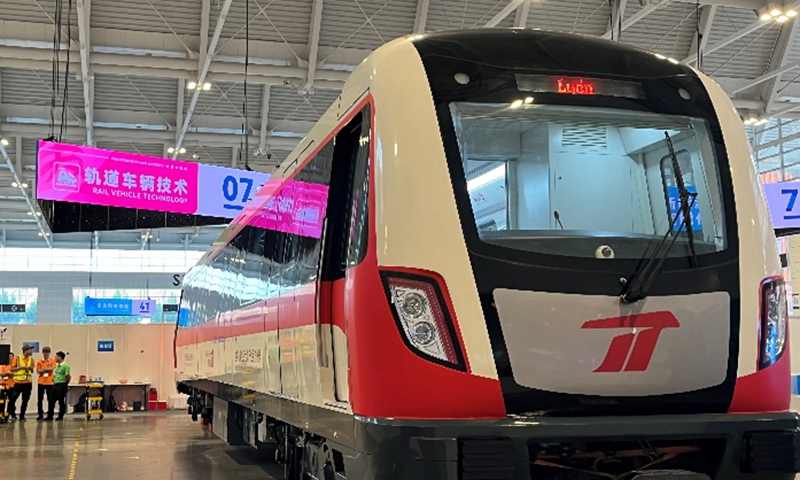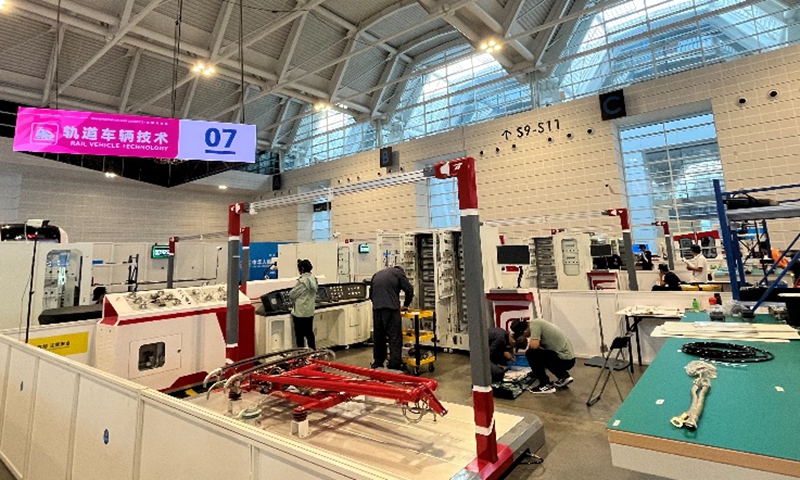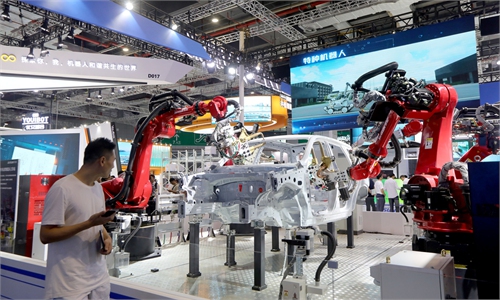
The event of rail vehicle technology is one of the 109 events under China's 2nd national vocational skills competition, which is organized for competitor's selection for the 47th WorldSkills Competition in Lyon, France, in September 2024. September 17, 2023. Photo: Zhang Changyue/GT

Photo: Zhang Changyue/GT
China values and is boosting vocational education in high-end fields such as artificial intelligence (AI), rail vehicle technology and information network cabling, etc, to cultivate more talents to match the development trend of these industries, experts told the Global Times on the sidelines of China's biggest vocational skills competition.
"Just like the building of highways, information network cabling is currently the foundation for all cutting-edge data transmission in 5G network, AI, big data and cloud computing. And we are cultivating talents whose capacities are closely integrated with the industry development through building more collaboration between technical schools and companies, and using competitions to promote the training effect," Peng Xuehai, a teacher from Shanghai Technical Institute of Electronics Information, told the Global Times.
Peng is the judge of the information network cabling event under China's 2nd national vocational skills competition, the biggest and most high-profile of its kinds which kicked off on Saturday in north China's Tianjin Municipality and aimed to promote the training, deployment, evaluation and incentive mechanism of skilled talents.
According to the Ministry of Human Resources and Social Security, the organizing committee of the competition, there were 4,045 competitors across the nation joining 109 events, 62 of which were organized for competitor's selection of WorldSkills -- such as information network cabling, rail vehicle technology and bricklaying. The winners will be included in the national team for the world competition in Lyon, France, in September 2024.
"Currently, Chinese participants in the field of information network cabling are already at an advanced international level. In the 44th WorldSkills Competition, we claimed a gold medal, and won the silver in the 45th and 46th competitions," said Peng.
The rail vehicle technology is another field where Chinese participants may claim championship in the coming WorldSkills Competition in Lyon. "The event is one where China sets the standards. We are already at the forefront globally. Both our coaching team and our participants are very confident in their abilities," said Shen Yuqiang, the Vice Dean of the Rail Transportation College at Qingdao Technician College and technical guidance expert of China's national training team for the 46th WorldSkills.
The event of rail vehicle technology used real subway cabins. It had four parts including the inspection and maintenance of electrification systems, the installation and testing of door modules, the maintenance and repair of air conditioning systems, and the troubleshooting and handling of faults in whole subway vehicles.
Shen Yuqiang told the Global Times that four modules aligned well with the goals of cultivating professional talents and have been included into vocational schools' teaching program.
Vocational education is an important part of the China education system and human resource development. It shoulders the responsibilities of developing a diversified pool of talents, passing on technical skills and boosting employment and entrepreneurship. Yet stereotypes and biases still remain in certain traditional techniques.
"As a traditional technique, the field of bricklaying has a trend towards intelligence and modernization as more and more construction robots and prefabricated buildings have been put into use. And People's demands for aesthetics, quality and precision in various types of buildings, including traditional Chinese architecture, are also increasing," Shen Yang, an engineer from Sichuan Vocational and Technical College of Communications, told the Global Times.
Shen said the current talent cultivation programs in bricklaying matched the general development trend of China's construction industry, but the problem lies in the lack of approval of bricklaying industry. "Ordinary people think bricklaying is just worthless manual labor and some students and their parents refuse to choose the field due to such cognition."
By holding a nationwide vocational skills competition, China is ramping up efforts in promoting the public's recognition toward all sorts of techniques, regardless of traditional ones or new ones. It has established the world's largest vocational education system.


